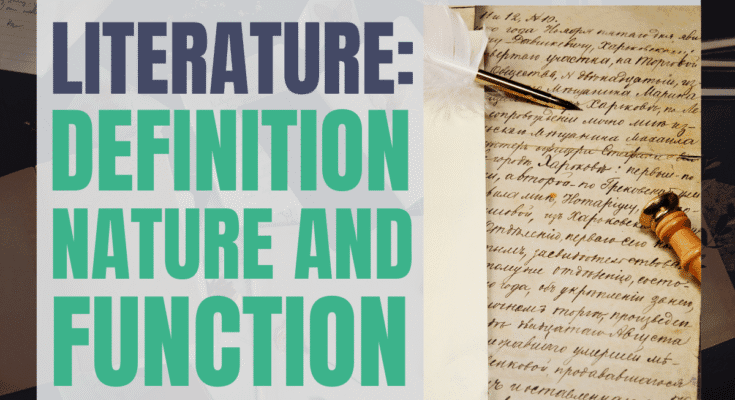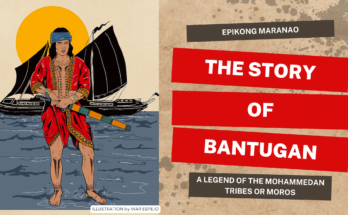Literature is everywhere—from the books we read, the plays we watch, and the poetry we admire, to the folk stories passed down through generations. But what exactly is literature? How do we define it, and why is it so important?
In this article, we’ll explore the definition, nature, and functions of literature, breaking it down into easy-to-understand sections with examples to illustrate key points.
Defining Literature
There are two general approaches to defining literature:
- The Broad Definition – Literature includes all written works, from research papers to novels, speeches, and even technical manuals. This is why we have terms like “scientific literature” or “political literature.”
- The Narrow Definition – Literature refers specifically to written, oral, or visual works that use artistic and imaginative language to express ideas, emotions, and human experiences.
Criteria for Defining Literature
Defining literature is not as simple as it seems. If we take a broad definition, literature includes everything that has been written—books, research papers, historical records, and even instruction manuals. However, this approach can be confusing because it includes texts that don’t necessarily belong to the realm of artistic or imaginative writing.
Additionally, this broad definition ignores oral traditions. Many cultures, especially in the past and among indigenous communities, preserved their stories, myths, and rituals through spoken word rather than written text. These oral traditions are just as valuable as written literature.
To provide a clearer distinction, scholars have identified specific criteria that separate literary texts from non-literary texts:
1. Fictionality
Literary works often come from the imagination, even when they are based on real events. They tell stories that may not have actually happened, but they convey deeper truths about human experiences.
Example: Novels like The Lord of the Rings create entire imaginary worlds, while historical fiction like The Book Thief uses real events (World War II) but with fictional characters.
2. Specialized Language
Literature uses beautiful, artistic, and often symbolic language that differs from everyday speech. Writers carefully choose words, use metaphors, similes, and other literary devices to create deeper meaning.
Example: A poem describing sadness might compare it to “a heavy rain falling on an empty street”, rather than simply saying, “I feel sad.”
3. Lack of a Pragmatic Function
Unlike news articles, textbooks, or instruction manuals, literature is not written just to provide direct information or instructions. Instead, it aims to express emotions, entertain, and make people think.
Example: A newspaper reports facts about climate change, while a novel like The Overstory uses storytelling to make readers emotionally connect with nature.
4. Ambiguity
Literary works often do not have just one clear meaning—they can be understood in different ways depending on the reader’s perspective, experiences, and emotions.
Example: A single poem might be interpreted as a love story by one reader, and a tale of loss by another. That’s the beauty of literature—it invites discussion and personal reflection.
So, What is Literature?
At its core, literature is a reflection of life. It captures:
- Emotions: Love, grief, joy, fear (e.g., Shakespeare’s Romeo and Juliet explores love and tragedy.)
- Ideas: Morality, philosophy, identity (e.g., Orwell’s 1984 critiques political control and surveillance.)
- Experiences: Personal and historical events (e.g., Anne Frank’s The Diary of a Young Girl recounts real-life war experiences.)
A common and widely-encompassing definition of literature is that:
It is an enduring expression of a significant human experience in words well-chosen and arranged.
- enduring – lasting, not ephemeral
- expression – sharing; a manifestation
- significant – important, necessary, meaningful
- human – people; different human conditions
- experience – the heart of literature
- words well-chosen and arranged
It comes from the Latin word “litera” which means an acquaintance with letters.
Literature can be defined as everything in print.
It is a body of literary productions, either oral, written, or visual, containing imaginative language that realistically portrays thoughts, emotions, and experiences of the human condition.
Some loosely interpret literature as a faithful reproduction of man’s manifold experiences blended into one harmonious expression. Because literature deals with the ideas, thoughts, and emotions of man, literature can be said to be the story of man. Man’s loves, grief, thoughts, dreams, and aspirations coached in the beautiful language is literature.
Literature is a product of a particular culture that concretizes man’s array of values, emotions, actions, and ideas.
The Nature of Literature
Literature is language in use that provides insights and intellectual stimulation to the reader. As one explores literature, he likewise discovers the beauty of language.
The language that is used by literature differs from ordinary spoken or written language.
Literature uses special words, structures, and characteristics. Primarily, the language of literature differs from ordinary language in three ways:
1. Concentrated and Meaningful
Every word in literature serves a purpose. Unlike casual speech, literary language is carefully crafted to convey deep meaning in fewer words. (e.g., Haiku poetry expresses profound thoughts in just 3 lines.)
2. Aims to Evoke Emotion, Not Just Explain
Literature is not just about conveying facts but about engaging the reader’s imagination and emotions. (e.g., A novel doesn’t just tell a story—it makes you feel what the characters feel.)
3. Demands Active Engagement
Readers must think critically to interpret the deeper meanings. Literature encourages analysis and reflection. (e.g., What does the green light symbolize in The Great Gatsby?)
The above three indicate that the language of literature has originality, quality, creativity, and pleasure.
Example: Compare a newspaper report and a poem about war. A news article explains the facts, while a poem expresses the emotions and trauma of war. Literature goes beyond information—it makes us feel and reflect.
The Functions of Literature
Why do we read literature? What purpose does it serve? Literature is both pleasurable and educational, as summarized by the Latin phrase:
“Dulce et Utile” (Sweet and Useful)
- Dulce (Sweet): Literature provides entertainment, enjoyment, and emotional connection.
- Utile (Useful): Literature teaches, inspires, and provokes thought.
4Rs of Literature
Recreation
Literature helps us escape reality.
- Example: Fantasy novels like Harry Potter allow readers to experience magic and adventure beyond the real world.
Recognition
Literature helps us see and understand people and cultures.
- Example: Novels like To Kill a Mockingbird highlight social justice issues and help readers develop empathy.
Redemption
Literature can inspire change in behavior and beliefs.
- Example: A Christmas Carol by Charles Dickens encourages kindness and generosity.
Revelation
Literature preserves and reveals history, traditions, and ideas.
- Example: Epics like The Iliad or historical novels give insights into past civilizations.
The Bottom Line
All the above definitions describe literature from different perspectives. Still, there are certain things that are common to them. They all recognize the fact that:
i. Literature is imaginative
ii. Literature expresses thoughts and feelings
iii. Literature deals with life experiences
iv. Literature uses words in a powerful, effective, and yet captivating manner
vi. Literature promotes recreation and revelation of hidden facts.
Literature is thus summed up as permanent expressions in words (written or spoken), specially arranged in pleasing accepted patterns or forms. It expresses thoughts, feelings, ideas, or other special aspects of human experiences.
What’s your favorite piece of literature, and why does it resonate with you? Let’s discuss in the comments!
This post was originally published on my previous website at Teacher Anele <iamteacheranele.wordpress.com>
If you’re looking for more resources about literature, then make sure to browse my page.




